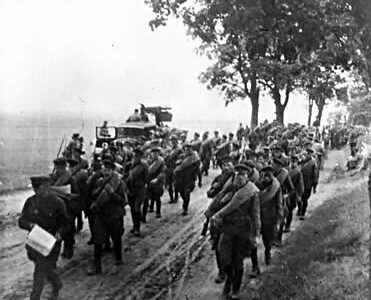Book Review of Alan Philps: The Red Hotel
by Patrick van Schie
Mr. Jones
In the 2019 film Mr. Jones, the Metropol Hotel in Moscow is portrayed as a hotbed of disinformation in the early 1930s. Jones is a recently unemployed British journalist, proud of having interviewed Hitler, and now eager to secure an interview with Stalin. He manages to obtain a visa for the Soviet Union and stays at the hotel where all Western journalists are housed: the Metropol. But Jones never gains access to Stalin. Instead, he travels through Ukraine, which at that very moment is suffering from a famine deliberately caused by the communist regime. Jones becomes the first Western journalist to report on it.
Although Jones is arrested by the NKVD (the predecessor of the KGB, which in turn preceded today’s Russian FSB), he persists after his release in making the outside world aware of the humanitarian disaster unfolding in Ukraine (what no one could imagine at the time was that eventually at least 4 million Ukrainians would die of starvation). Up to that point, Western journalists stationed in Moscow had been spreading false reports, claiming that the Soviet Union was a land of plenty.
At the Metropol Hotel, Jones is also pressured by Walter Duranty, the uncrowned king of Western journalists, to publish a retraction, calling his own reporting on the Holodomor (the man-made famine) in Ukraine false. Duranty was the New York Times correspondent, living like royalty in the Metropol Hotel while spreading Soviet propaganda. He was awarded the Pulitzer Prize, which has never been revoked—even after it became clear that Duranty’s “reports” on the Soviet Union were built on lies. Jones refused to sign the statement Duranty presented to him. Thus, the Western public was able to learn about the Holodomor. In revenge, the NKVD managed to have Jones murdered a few years later, in 1935.
The Red Hotel
The Metropol Hotel is also at the heart of Alan Philps’s 2023 book The Red Hotel. The same hotel, the same setting. By then, the hotel had become shabbier, and the author focuses on the period of the Second World War, when the Soviet Union had become an ally of the United States and Great Britain against Nazi Germany. Again, the hotel was teeming with Western journalists, many of them drawn to Moscow by their Marxist convictions and their idealized image of life in the Soviet Union: fellow travellers.
Philps describes the experiences of some of these journalists as well as those of several Soviet women assigned to monitor them and feed them false stories. Like the film Mr. Jones, The Red Hotel is based on true events (NB: it should not be confused with the similarly titled thriller by Gary Grossman and Ed Fuller).
The journalists described fall into several categories. Some continued to spread lies long after the war, ranging from portraying the Soviet Union as a prosperous country to reporting supposed Red Army victories over the Germans at times when, in reality, the Germans were only advancing. Others knew better, lost their belief in the “workers’ paradise,” but for opportunistic reasons continued writing positively about the Soviet Union, fearing they would otherwise be expelled from the country. A few had their eyes truly opened, and their disillusionment led them to refuse to function any longer as pawns in Soviet propaganda.
Examples of disinformation via western Journalists
Two examples show how these journalists knowingly participated in disinformation.
First: In the early months of the German invasion, while the Red Army was suffering defeat after defeat or retreating without fighting, Western journalists were taken by the NKVD to places where there was no fighting at all. Still, they wrote “frontline reports” full of stories about how the heroic Red Army had annihilated several German divisions.
Second: In January 1944, a group of Western journalists was taken to Katyn, where the Germans had previously discovered a mass grave of Polish officers. These officers had been murdered there in 1939 by the NKVD, after the Red Army invaded and occupied eastern Poland under the secret clause of the Molotov-Ribbentrop Pact. The Soviet Union executed the Polish officers because they were part of the country’s intellectual elite and could form a nucleus of resistance against future communist domination. But the Soviets tried to pin the massacre on the Germans—a lie they upheld until 1992, when Russian president Yeltsin finally admitted the NKVD had committed the crime.
During the journalists’ visit in 1944, it was already obvious that the NKVD’s fabricated story didn’t hold up, and NKVD officers reacted irritably when critical questions were raised. Yet the journalists wrote exactly what Moscow wanted: that the mass murder had been committed by the Germans.
Soviet female spies
The lives of the Soviet women employed by the regime to handle the journalists took different turns. On one hand, The Red Hotel tells the story of Tanya Svetlova, who managed to marry a Westerner and escape life in the Soviet Union—an exception. On the other hand, there were women who dutifully served the regime during the war. But in the Soviet Union, such service often went unrewarded. After the war, anyone who had had contact with Westerners was considered suspect. Such a woman must surely have been a foreign spy and an agent of imperialism, regardless of the fact that she had acted on orders from the Kremlin.
The Red Hotel recounts the ordeal of one such unfortunate woman, Nadya Ulanovskaya, who spent nearly ten years shuttling between the Lubyanka prison, the Lefortovo prison (both in Moscow), and a Gulag camp in Mordovia. Her primary form of torture was sleep deprivation. By day she was forbidden to lie down or sit in her cell. At night, when she tried to sleep, she was taken out for an interrogation that could last all night; sometimes the interrogator ignored her completely, leaving her to sit on a stool across from him. Back in her cell, she was again forbidden to sleep—it was daytime, after all. She was arrested in 1947 and only released in 1956, three years after Stalin’s death.
Blindly faithful leftist journalists from the West
Of course, the Western journalists housed in the Metropol never reported on such matters. The book The Red Hotel: The Untold Story of Stalin’s Disinformation War (its full title) shows how Marxist-believing Westerners deceived both themselves and their readers. The book does not really explain what motivated them, but it is important to see once again that far-left sympathizers or accomplices will not hesitate to spread lies if it serves the advancement of communism.
Read also: https://eioco.nl/en/katyn-disinformation-and-memory-a-new-article-in-de-militaire-spectator/
Watch also: https://www.imdb.com/title/tt6828390/





Follow Us!